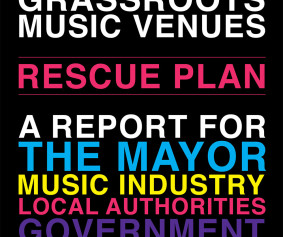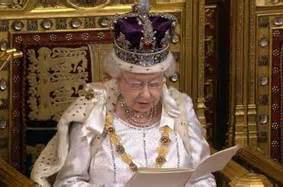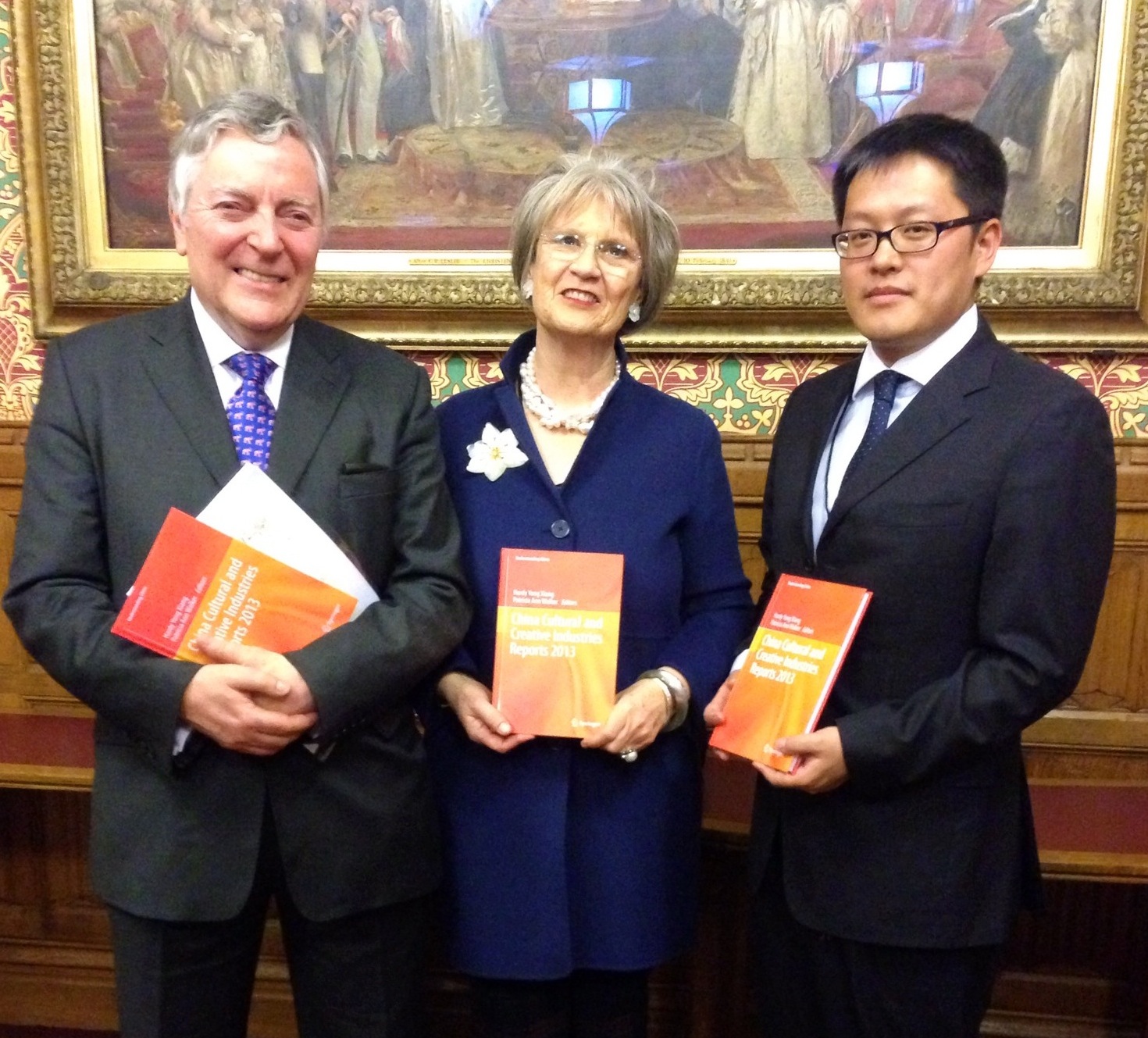Lord C-J Demands Action from Government on Venue Closures
In the light of huge concern expressed at Venues Day 2015 and in the Rescue Plan put together by the Mayor's Music Venues Taskforce I recently instituted a debate in the Lords about what plans the Government have to support small grass-roots music venues.
This is what I said.
According to UK Music’s latest figures, the music industry now contributes £4.1 billion to the UK economy, generates £2.1 billion in exports and employs more than 117,000 people. The sector as a whole grew by 5% in 2014. While our music industry is succeeding in many aspects, behind these impressive figures, elements of the sector are not doing as well. The focus of this debate, and of my remarks today, concerns what plans the Government have to support small grass-roots music venues. I am delighted that so many other music-loving noble Lords are joining in today’s debate.
Earlier this year, the Mayor of London established a Music Venues Taskforce. Chaired by the Music Venue Trust, and involving the Musicians’ Union, UK Music and representatives from two London venues—the 100 Club and Village Underground—the task force published its Rescue Plan in October to address the 35% decline in grass-roots music venues in the capital since 2007. While a lot of the publicity for grass-roots venue closures has been centred on London, the issue of grass roots is not unique to the capital. Venues such as Leicester’s Princess Charlotte, TJs in Newport, the Duchess of York in Leeds, the Picture House in Edinburgh and the Roadhouse in Manchester have all closed due to a number of issues that add up to the same thing: running a grass-roots music venue is becoming increasingly challenging.
In the task force’s Rescue Plan, the Music Venue Trust came up with a definition of a grass-roots music venue—as distinct from other premises—centred primarily on its cultural and social role and based on music programming being the establishment’s raison d’être. Furthermore, being a grass-roots venue means being a beacon of music and a key generator of night-time economic activity, and taking risks with programming and acts.
I am sure that many noble Lords have been enjoying the latest album from UK artist Adele, 25, which has set records around the world for sales and is likely to be this year’s global music success story. Adele played her first gig at the 12 Bar Club in London, whose Denmark Street venue is now closed. She went on to play support slots and small shows across the country, building her skills and her experience in front of small audiences in the manner that has enabled UK artists to thrive for the last 50 years. Had it not been for thevital grass-roots music venue circuit, it is difficult to see how an artist such as Adele could have cultivated her creativity. In 1994, a little-known band by the name of Oasis undertook a 25-date tour of the UK which transformed them into the world’s leading live band. Of those 25 venues, only 12 remain open.
The UK’s ability to create more acts like Adele and Oasis is being challenged by a number of threats to these important institutions. These threats include rising property prices and rents, increased demand for housing in big cities, increases in business rates, lack of specific guidance on how to treat music venues in planning law, increased deregulation of the planning system—notably the permitted development right from 2013, which allows offices to be converted into homes without the need for full planning permission—and increased conditions put on other aspects of a venue’s licence, despite the exemptions put in place by the Live Music Act.
There has been a lack of central government legislative support when contrasted with other key music markets such as the USA or Australia. In financial terms, across continental Europe, the grass-roots music venues sector has attracted significant direct government or industry subsidy, which distorts the market, making it difficult for our venues in the UK to compete for international talent. Thankfully, there are a number of sensible actions that the Government can take in order to alleviate the problems for grass-roots music venues.
First and foremost, the Government should introduce the agent of change principle into planning law. This principle would mean that when a planning development is granted, the onus is on the incoming individual or business to take responsibility for any changes needed to deal with noise from businesses that existed in the vicinity before permission was granted. Such a provision would significantly reduce the financial and administrative burden placed on venues when new development occurs. The principle has already been adopted in some states in Australia and the US. The Mayor of London has indicated that the agent of change principle will be adopted in the London Plan 2018.
Will the Minister undertake to look at how primary legislation can be strengthened in this regard? An opportunity exists in the Housing and Planning Bill, where amendments to introduce the agent of change principle have been debated in the Commons. In the debate on Tuesday, Planning Minister Brandon Lewis rejected the amendments as unnecessary. He claimed that the National Planning Policy Framework incorporated the principle and so did the guidance—I suppose that he meant paragraph 6 of the noise planning guidance.
However, he said that he is trying to meet the music sector on this in conjunction with Culture Minister Ed Vaizey who pledged to arrange a meeting with a delegation when he attended Venues Day 2015, the annual national gathering of grass-roots music venues from across the UK, which is organised by the Music Venue Trust. UK Music has followed up on this but no date has been confirmed. Can the Minister undertake that this will happen before Report in the Commons on the Housing and Planning Bill?
Will the Minister also consider how the ground-breaking deed of easement of noise in the recent Ministry of Sound case can be further promoted as good practice in resolving cases between developers and venues? Will he also commit to a biannual meeting of key Ministers to consider, develop and monitor strategies of support for venues?
Secondly, the Government should introduce full relief from business rates for grass-roots music venues. As I have already outlined, business rates are problematic for music venues. A small London venue may pay tens of thousands of pounds a year in business rates, making it economically unviable without financial support. The Government are conducting a review into business rates relief for local newspapers. This creates a potential precedent for the Government to review rates for grass-roots music venues. Such a measure would go some way towards correcting the imbalance in cultural subsidies with our European competitors.
In monitoring the impact of the Live Music Act and further entertainment deregulation from earlier this year, the Government should review whether local authorities and the police are utilising and over- regulating other licensing conditions to regulate certain music venue activities which should otherwise benefit from the full impact of the coalition Government’s entertainment deregulation reforms. Internal government co-ordination is also key to this issue. This debate is being responded to by the noble Earl, yet other aspects of government such as DCLG, Defra and the Home Office also have a strong interest in this.
At Venues Day 2015, Minister Ed Vaizey firmly backed the idea that grass-roots music venues should have access to cultural funding. What steps are the Government taking to ensure that that happens, and specifically what can be done to ensure that any available funding acts directly to improve the infrastructure in those venues so that they are attractive places for touring artists to play?
Finally, will the Government make a specific response to the Mayor of London’s Music Venues Taskforce report, and what further work are they planning to undertake with other large cities and communities in the UK to promote the vital role of grass-roots music venues?
We protect and support our theatres, arts centres, civic centres, museums and galleries by recognising their cultural priorities. The Government should do all they can to ensure that these vital incubators of the live music industry are able to access similar levels of support and recognition from national government and local authorities as those received by other spaces. These issues are urgent for the future of live music venues and I hope that the Minister will respond appropriately.
The Minister's reply is here:
http://www.publications.parliament.uk/pa/ld201516/ldhansrd/text/151210-gc0001.htm#15121057000162
It showed they are taking the matter seriously particularly on the planning front. We will be testing their intentions when the Housing and Planning Bill comes to the Lords shortly and we will be putting down amendments to introduce the principle of the Agent of Change into primary legislation.
Lord C-J asks: Will this Government build on the achievements of the last?
This week in the debate on the Queen's Speech I urged the Government to build on the positive record of the coalition government in its support for the development of the UK's creative industries.
The UK’s creative industries have been one of the great success stories of the past five years. Significant policies benefiting these industries were developed during the coalition Government. I pay tribute to Vince Cable for all his work as the Business Secretary.
I want to see creative businesses continue to thrive across the whole country so that our economy can continue to reap the benefits. It is vital that we do not lose the momentum. Will this Government build on the achievements of the last? That is the question.
To maintain that momentum we need to encourage clustering of creative businesses developed through alliances between central government, local authorities, universities and the private sector in our major cities. Our cities and many counties need greater powers, especially over finance. I therefore welcome in principle the proposed cities and local government Bill as part of the Government’s northern powerhouse strategy.
Many noble Lords have talked about development of digital skills being vital. Expansion of digital platforms has highlighted the growing convergence of creative content and the tech sector. Skills in the arts and sciences are increasingly drawn together. Will the Government promote the value of creative subjects in schools and ensure that they are rewarded for offering a broad and balanced curriculum?
The number of apprenticeships created and taken up in the creative industries has expanded hugely in the past few years. I hope that they will enhance the co-ordination of action on skills by merging the two skills councils, Creative and Cultural Skills and Creative Skillset, into a single powerful and effective body. Will the Home Office break the habit of a lifetime and ensure with BIS that the tech and creative industries are able to fill the gaps in high-end skills, from abroad if necessary?
As we have heard today, our broadcasters are the linchpin of the creative industries and there are some key questions in that regard. Will the Government maintain Channel 4 in public ownership? Will they follow up the consultations started in March on Section 73 of the Copyright, Designs and Patents Act, which requires public service broadcasters to give away their most valuable product—their channels—to the pay-TV cable platform in the UK, and repeal it?
We had a mini debate on the BBC today and contributions on the BBC were made yesterday. Under John Whittingdale’s chairmanship, the Culture, Media and Sport Committee produced a valuable report on the future of the BBC with many useful observations and recommendations, including on governance and extension of the licence fee to iPlayer-only users, which can, and no doubt will, be taken forward into the charter discussions—and so too, I hope, will the committee’s views on the need for open and transparent discussions on the charter. Will there be a full and open debate on any decriminalisation proposals and will the potential financial cost of such a policy to the BBC be fully recognised? We need strenuously to protect the independence of the BBC. Currently, the licence fee is the best way of doing that. However, that does not mean that it needs to rise faster than inflation.
Investment in the UK’s creative industries can only really make a difference if their intellectual property rights, particularly those relating to the protection of their online materials, are properly understood and enforced. It was good to see the acknowledgement in the Conservative manifesto of the importance of intellectual property and of proper behaviour by search engines. However, I was rather baffled by some of the statements in the manifesto. It says:
“We will protect intellectual property by continuing to require internet service providers to block sites that carry large amounts of illegal content”.
I do not recall that we were able to persuade the last Government to bring in any legislation to do that. The legislation remained unenforced on the books, so I think there are questions to be asked about that. Is it not crucial that we should educate consumers on the importance of intellectual property and support initiatives designed to get voluntary agreement from the advertisers and credit card companies not to advertise on infringing sites?
Will the Government continue to support the long-term funding of the Police Intellectual Property Crime Unit, or PIPCU, which carries out such vital work? Will they increase sanctions relating to online offences in line with the recent government review of penalties for online copyright infringement, Penalty Fair?
I regret that we shall spend the next two years arguing about membership of the EU. I hope that, at the same time, the Minister will find time to work with our EU partners to ensure that proposals for copyright reform as part of the single digital market proposals do not damage our creative industries by limiting territorial licensing.
I very much hope that the Government will continue discussions with artists and creators on extending the law governing unfair contracts to include intellectual property contracts. I very much hope that, when possible under EU law, the application of public lending rights to remote e-lending will be extended.
II very much hope that the Government will continue to promote the value of live music despite the powers created in the Anti-social Behaviour, Crime and Policing Act, which are already being used disproportionately. I agree 100% with the noble Baroness, Lady Liddell, and with the comments made by my noble friend Lord Lee yesterday, on the importance of our tourism industry, which so far, even after five years of the last Government, has been treated as a Cinderella and holds such promise for job creation in the years up to 2020. Time will tell.
In her response Baroness Neville-Rolfe the IP Minister said:
"To make sure that the UK retains its position as the world’s best IP regime, we will also focus on a number of measures including: improving our rights-granting services; reforming the law to improve protection for businesses; striving to improve international patent systems; and educating businesses and consumers about IP. The consultation on Section 73 is continuing. The noble Lord, Lord Clement-Jones, is right to say that enforcement is incredibly important. It is great that we have managed to extend the life of PIPCU, and we are looking at future options for funding. He will also be very glad to know that we have used Section 97A to block access to websites alleged to host 10 million infringing e-books"
Busking: Let's Back Voluntary Action over Regulation!
Good to see that the work of the Mayor's Busking Taskforce has now come to fruition with the launch of Busk in London and the new voluntary code of conduct.
Many congratulations to Paul Broadhurst, Julia Jones, Jonny Walker, Nick Broad and many others.
Launch of China Cultural and Creative Industries Reports 2013
Last week I helped to launch a fascinating set of reports on China's creative industries edited by Professor Trish Walker and Professor Hardy Yong Xiang.
See the weblink here:
http://link.springer.com/book/10.1007%2F978-3-642-38157-7
I've done a foreword in which I discuss the opportunities for creative partnership between Britain and China. This publication will help enormously in developing those partnerships.
Here is what I said:
Creative employment in the UK provides around two million jobs, in the creative sector itself and in creative roles in other industries. In recent times employment in the sector has grown at double the rate of the economy as a whole.
Something very important for the creative industries is also happening in China.
In business the emphasis is now on creativity. This is very much reflected in the 12th five-year plan that is underway and marks an important new approach where creative and artistic skills are being highly valued.
At the same time I have seen a great interest in China in creating partnerships with British creative industries and creators, particularly in games and new media, publishing, architecture, design, fashion, animation, music, film, radio, television and advertising, especially after the spectacle of the Olympic and Paralympic ceremonies and the success of the British pavilion at the Shanghai Expo.
We now have great opportunity for creative and artistic partnership between China and the UK. There is a real role for collaboration between us in helping developing creative industries clusters in China.
These reports will be invaluable in helping British creative industries develop a strong understanding of where they can develop partnerships in China, and I very much welcome Prof. Patricia Ann Walker and colleagues’ initiative in putting such a comprehensive publication together.
Speech on startups gets a response!
The day after my creative industries speech I was delighted to receive the following email from Care Home Owner David Crabtree. As I said to him "You inspire me back. It's really good to know someone is listening! Please do persevere with your project"
Dear Lord Clement - Jones
By chance as I switched on my TV this morning at 6 a.m as you were delivering a speech and outlining the many resources for funding and encouragement of digital and other media start ups.
Your speech was inspiring, very informative, and extremely well delivered as I would normally have skipped the TV channel.
I have been nursing for over forty years and whilst many were spent in the field of addiction working with alcohol and drug dependents and their families, I started out and now finish my career working with people and their families who suffer from dementia.
Many are under 60 and their dementia, Korsakoffs has been brought about primarily by the addiction to alcohol.
It is in doing this work, I have been trying to source a digital watch which will alert the family member to someone leaving the home, combined with a gps tracking system which will locate the watch and it's wearer should they go beyond a pre set parameter.
Many years ago I was a nurse in a ward where someone wondered off and despite police helicopters and tracker dogs they were found dead some three days later. The police resources we spend looking for people with dementia is very costly.
I have now sourced one in the UK but the costs may be too prohibitive at the moment for general use, which is why your speech was so informative and timely.
In working as a counsellor with addiction and families one never knows if the information you give out will be of any use, as it can take many years and attempts to get clean, as I know only too well from person experience, so the saying in AA is that a flower never sees the seed.
Today your speech has inspired me to see if the technology and start up funding for the watch is available in the UK, and I wanted to both acknowledge your work and thank you.
My best wishes to you and your family , and should you come North meeting for coffee would be a great pleasure for me.
Many thanks again for all the work you do on behalf of so many of us.
David Crabtree R.M.N
www.crabtreecarehomes.co.uk<http://www.crabtreecarehomes.co.uk>
http://m.youtube.com/watch?v=Q4kqLeMoSi8&feature=plc
Britain and China: A Creative Partnership : LSE Confucius Institute Lecture
Lord C-J looks to the Future of IP policy
I recently gave a speech to the Inside Government Intellectual Property 2014 Conference
Here is the text.
Intellectual Property Policy:The Way Forward
In modern times Britain has become renowned in for its creative industries, in particular for pre-eminence in the world of pop and rock music, for the work of its designers and architects and for its television and film content and formats. We are now coming to the fore in fashion and computer games.
This creative output comprises one of the UK's great assets.The UK’s creative industries are now worth £71.4 billion per year to the UK economy, at least 5% of the UK Economy and 10 % of all UK exports.
Sector growth outperforms all other sectors of UK industry and it now accounts for almost two million jobs.
A crucial factor in recent growth has been the tax treatment of film production. This has been followed by high end television and animation and in April the video games relief was cleared by the EU. The new theatre production tax relief and patent box will have a major impact too.
In July we saw launch by the Creative Industries Council of Create UK, the creative industries strategy. Its aim is to double the sector’s annual exports to £31 billion by 2020.
At the launch Vince Cable announced a £16m funding package to boost skills in the creative industries. This injection of capital investment is part of the Government's strategy to support the UK's position as a world leader in the sector.
Create UK calls for a “stable legal framework that allows rights to be protected and commercialised” and says “any consideration of amendments to the IP frameworks” needs to be “thorough, objective, evidence-based and transparent”.
This however has been far from the case since the conclusion of the Report by Professor Ian Hargreaves in 2011 designed to set out how the intellectual property framework can promote innovation and economic growth in the UK economy.
The impression given by the Report was that intellectual property rights are a barrier to innovation.
Even as far back as the landmark Statute of Anne in 1710 however the benefits of copyright, particularly the rights of creators, were recognized.
Indeed the title of the Act is: “An Act for the Encouragement of Learning, by Vesting the Copies of Printed Books in the Authors or Purchasers of Copies.., etc”
As a result the provisions of the Digital Economy Act passed in the washup before the General Election of 2010, which would have given the creative industries some protection from digital piracy, remain unimplemented.
I myself in trying to make sure that there were greater powers to block infringing websites found myself depicted as an internet villain!
Luckily and thanks to the industry the Newzbin2 case brought by the MPA and the UK Pirate Bay case have established that an existing provision of the CDPA 1988 is effective in taking down these sites.
Following the Hargreaves Report we have had the Enterprise and Regulatory Reform Act which set out the legal basis for introduction of new copyright exceptions, Extended Collective Licencing and the treatment of Orphan Works.
It is hard to see, despite the elaborate process undertaken to introduce Exceptions, what major positive impact any of these with the possible exception of Parody, will have.
Indeed in a number of cases they seem to militate against the commercial licensing solutions being made available by rights owners.
Extended collective licensing and orphan works provisions have a narrow UK application and similarly are unlikely to make a major impact.
One area where there have been positive development is in the field of designs.
The ERR Act ensured that works of Artistic design would be protected (think chairs!) with the repeal of s52 now under consultation and the Intellectual Property Act introduced a criminal penalty for infringement of registered designs.
Admittedly some of us felt this should go further in the light of the fact that protection for 2D is so much better than for 3D.
Moreover in the end the provisions of the Bill were watered down so the test of whether a design was “substantially” copied was replaced by “with features which differ only in immaterial detail” for the purposes of criminal prosecution.
The ERRA also laid the ground for Collecting Societies Codes of Practice which lay down minimum standards of behaviour. Given the power of the collecting organizations this was welcome.
One major and welcome fruit of the Report is however the Copyright Hub which made a bright start thanks to Richard Hooper and Dr Ros Lynch. Compared with nearly all the other reforms the voluntary solution of the Copyright Hub is highly likely to have a major impact combined with international application.
The Hub has received £150k in goverment funding. According to its new director Dominic Young it is changing from “signposting tool” into an “intelligent router” and it will make a major difference in taking down the barriers to effective copyright licensing.
But it will be shortly totally reliant on private sector business funding and I hope the industry will make sure that it goes on to be a great success with the necessary resources.
If it does, it has the potential to be a Global Hub for copyright licensing. London and the UK could be at the centre of a hugely significant and powerful means of ensuring that creators receive the fruits of their endeavours worldwide.
We are also making strides in music licensing through the Global Repertoire Database RD which has its Operations HQ in London
Throughout the reform process the creative industries sector have been concerned by the potential negative impact the reforms could have, with the potential to deter investment, risk jeopardising market-led developments and weaken performer/creators ability to benefit financially from their work.
Changes to IP law should be adopted only in response to a well defined public policy objective and market failure. They should be underpinned by robust Impact Assessments. In fact the quality of these has been poor.
Reform of copyright should be handled sensitively with the value of the creative industries, and any negative impact caused by changes to the law, firmly in mind and this has clearly not been the case.
Furthermore investment in the UK's creative industries can only really make a difference if the industry's intellectual property rights, particularly relating to the protection of their online materials, are properly enforced.
The industry has changed dramatically in the wake of the digital revolution. That there is a major issue regarding online intellectual property theft, in the form of illegal downloads accessed via pirate websites, is beyond dispute.
Communications watchdog Ofcom revealed last year that a staggering 1.5 billion files were illegally downloaded in 2012.
The MPAA in their report “Understanding the Role of Search in Online Piracy” assess the value lost through of piracy in the UK at £400m pa for music and film alone.
Indeed, the issue of intellectual property theft goes beyond the creative industries and impacts financial, professional and support services - industries that collectively form the backbone of the UK economy and the 'knowledge-based' economy that the UK has long relied upon for success.
The Chancellor George Osborne has recently spoken about promoting Britain's financial technology industry - or FinTech - as a global pioneer in alternative funding vehicles and digital currencies, such as Bitcoin.
However, the UK cannot hope to become a leader in this field without rigorous IP protection and enforcement.
The post Hargreaves reforms are not designed to prevent online piracy.
Advertising, often by well known brands on pirate websites, is propping up the pirates and encouraging them to continue in their IP theft activities.
The Police Intellectual Property Crime Unit (PIPCU), a specialist IP crime unit within the City of London Police, has been engaged in activities designed to disrupt the flow of money from advertisements to those that run copyright infringing websites.
The Follow the Money initiative led by Mike Weatherley MP, the former intellectual property adviser to the Prime Minister which is designed to get voluntary agreement from the advertisers and credit card companies not to advertise on these sites is a significant and welcome development.
The fact remains though that IP piracy represents an existential threat to the UK creative industries and the Government needs to put an emphasis on enforcement if it is to help the industry assert its intellectual property rights and combat the online pirates.
Major search engines have an important role to play too. They have often had an uneasy relationship with the likes of the BPI who demonstrate that illegal sites persist in coming high on search rankings despite literally millions of infringement notifications to them.
Google have recently announced moves which will downrank illegal download websites in searches.
There also needs to be a coordinated push to educate people of the importance of IP and of only downloading legitimate material via legal websites. This ordinarily means of course that people must pay for content and be strongly discouraged from illegal downloading.
The recent report Copyright Education and Awareness published this month by Mike Weatherley and rights holders such as the PRS is a greatly welcome development.
Of course he has already made a major contribution to IP education through Rock and Film the House which he founded.
We shall have to erect a statue to him when he leaves Parliament next year!
A key recommendation is about the IPO and a recommendation that there a broader IP Director General role is created along the lines of the US IP Tsar.
The Culture Media and Sport Committee rightly in its report last year raised a question mark over the Intellectual Property Office’s ability to be a strong IP champion but with recent personnel changes to that office I am much more optimistic that a major change in mindset is occurring.
The fact is however if the UK creative industries are to remain the powerhouse they currently are, people need to pay for creative content that the industries produce.
There are a number of vital aspects that need attention:
- The protection of IP must be rigorously enforced and the Government should consider either implementing the provisions of the Digital Economy Act or ensuring that robust voluntary arrangements exist with the internet service providers, so that piracy is detected and deterred.
- Digital copyright infringement sanctions need to be enhanced. We urgently need to equalise the maximum penalties for digital and physical IP infringement. I look forward to the outcome of the Government’s current review of the use of copyright infringement sanctions which is expected to report in November.
- We need to ensure too that there is a common understanding across the creative industries of what metadata needs protecting and how to do this. We need general acceptance of the Voluntary Code of Practice for Creating and Retaining Metadata in Images.
- PIPCU –the Police Intellectual Property Crime Unit-is a vital resource in combatting counterfeits and infringers. It has made a huge impact in its first year of operation. We -Government and industry- need to ensure its future funding beyond 2015.
- Then of course during the passage of the Consumer Rights Bill I have been arguing for better protection against lookalike products which whilst falling short of being counterfeit nevertheless are designed to give the cynical impression through sailing close to IP infringement that they are equivalent to the original product.
- 3D printing is already throwing up important issues. What forward thinking has been carried out by the IPO?
As it is there are major other issues coming down the track from Brussels. After an EU discussion paper in 2011 on the Single Market for Intellectual Property Rights debate will take place on matters such as user generated content, further artists resale rights and other reforms.
DG Markt and DG Connect are clearly at odds. Where does the UK stand in this debate? In fact we need a great deal more European cooperation through for instance the European Union Observatory on the Infringement of Intellectual Property Rights rather than a raft of reforms.
The recent International Summit IP Enforcement Summit hosted by BiS and the IPO in London, designed to co-ordinate strategy and action was exactly what is needed.
The international dimension of IP is important to our ability to monetize our creativity overseas. I chaired an IP roundtable at a TIF-IN Conference in Qingdao, China for the creative industries and IP protection is a fundamental issue in doing business in emerging markets.
To its credit the Government have placed IP attaches in major markets such as China and Brazil which can advise UK companies on the IP landscape.
In conclusion.In the UK we have the potential to be the recognized world leader in the development of the digital economy.
But of course now in the digital economy there is increasing convergence –indeed symbiosis- between platform and content, between the tech sector and the creative industries.
creative industries.
There is no doubt that each sector is increasingly making use of relevant skills in the other and that of course means valuing the intellectual property of each other.
In recent otherwise excellent manifestos from the TechUK –which I helped to launch-and from COADEC there is no mention of Intellectual Property.
So my parting shot to the Tech sector is, please acknowledge digital realities, you and the creative industries need each other so recognize the value of IP and the fact you have a common interest in protecting it!
Thank you
A Warm Welcome to the Copyright Hub
Very good to see that the Copyright Hub, the new database designed to simplify copyright licensing which Richard Hooper and Ros Lynch have been working on with the co-operation of all the creative industries and rights holders, is up and running at
What a contrast to the way the IPO has gone about adding new exceptions to copyright! Rather than rush into agreeing the new exceptions-for parody, education etc we should see how the Hub works in obviating the need for new exceptions.
Amazing Isabella Blow Exhibition at Somerset House
Isabella or Issie as she was known was my 2nd cousin and a fashion legend who whilst Tatler Style Editor, Fashion Editor of The Sunday Times Magazine and in other roles "discovered" and nurtured Alexander McQueen, Philip Treacy and a http://healthymanviagra.com/ number of other major designers but who tragically committed suicide in 2007. The launch last week had just about everyone of note in the British fashion industry there.
This exhibition not only describes her family background (grandaughter of White Mischief Sir Jock Delves Broughton and Lady Vera Broughton pioneering explorer and photographer) and career but includes a incredible collection of her designer clothes, with some amazing hats. As I said to her sister Lavinia afterwards, it was touching, fascinating and astonishing all in one.









